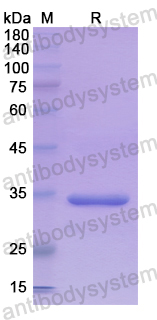Catalog No.
YMH39101
Expression system
E. coli
Species
Mouse
Protein length
Asn100-His508
Predicted molecular weight
48 kDa
Nature
Recombinant
Endotoxin level
Please contact with the lab for this information.
Purity
>90% as determined by SDS-PAGE.
Accession
Q91ZJ5
Applications
ELISA, Immunogen, SDS-PAGE, WB, Bioactivity testing in progress
Form
Lyophilized
Storage buffer
Lyophilized from a solution in PBS pH 7.4, 0.02% NLS, 1mM EDTA, 4% Trehalose, 1% Mannitol.
Reconstitution
Reconstitute in sterile water for a stock solution. A copy of datasheet will be provided with the products, please refer to it for details.
Shipping
In general, proteins are provided as lyophilized powder/frozen liquid. They are shipped out with dry ice/blue ice unless customers require otherwise.
Stability and Storage
Use a manual defrost freezer and avoid repeated freeze thaw cycles. Store at 2 to 8°C for one week. Store at -20 to -80°C for twelve months from the date of receipt.
Alternative Names
UGP2, UTP-glucose-1-phosphate uridylyltransferase, UGPase, UDPGP, UGP1, UDP-glucose pyrophosphorylase
De Novo Transcriptome Sequencing Analysis Revealed the Expression Patterns of Genes in Different Organs and the Molecular Basis of Polysaccharide Synthesis in Bletilla striata., PMID:40428380
Primary metabolomics and transcriptomic techniques were used to explore the regulatory mechanisms that may influence the flavor characteristics of fresh Corylus heterophylla × Corylus avellana., PMID:39949634
UGP2, a novel target gene of TP53, inhibits endothelial cells apoptosis and atherosclerosis., PMID:39818283
Regulation of gene expression in milk secretory pathways during secretory activation in Holstein cows., PMID:39245162
Glycolytic PFKFB3 and Glycogenic UGP2 Axis Regulates Perfusion Recovery in Experimental Hind Limb Ischemia., PMID:38934117
[Identification of Protein-Coding Gene Markers in Breast Invasive Carcinoma Based on Machine Learning]., PMID:38686709
UDP-Glucose/P2Y14 Receptor Signaling Exacerbates Neuronal Apoptosis After Subarachnoid Hemorrhage in Rats., PMID:38525592
Reyanning mixture inhibits M1 macrophage polarization through the glycogen synthesis pathway to improve lipopolysaccharide-induced acute lung injury., PMID:38508433
MicroRNA-92b in the skeletal muscle regulates exercise capacity via modulation of glucose metabolism., PMID:37985354
Quantitative proteomics analysis reveals the key proteins related to semen quality in Niangya yaks., PMID:37875878
Non-small cell lung cancer patient with a rare UGP2-ALK fusion protein responded well to alectinib: a case report., PMID:37450292
Distribution of Exonic Variants in Glycogen Synthesis and Catabolism Genes in Late Onset Pompe Disease (LOPD)., PMID:37185710
Metabolic Hijacking of Hexose Metabolism to Ascorbate Synthesis Is the Unifying Biochemical Basis of Murine Liver Fibrosis., PMID:36766828
Transcriptomic changes underlying glucocorticoid-induced suppression of milk production by dairy cows., PMID:36561310
High expression of glycolysis-related PGM2 gene in relation to poor prognosis and deficient immune cells infiltration in lung adenocarcinoma: a study based on bioinformatics analysis., PMID:36245582
Leveraging orthology within maize and Arabidopsis QTL to identify genes affecting natural variation in gravitropism., PMID:36161933
Lysosomal glycogen accumulation in Pompe disease results in disturbed cytoplasmic glycogen metabolism., PMID:36111639
N6-methyladenosine RNA methylation regulator-related alternative splicing gene signature as prognostic predictor and in immune microenvironment characterization of patients with low-grade glioma., PMID:35937991
Complementary omics strategies to dissect p53 signaling networks under nutrient stress., PMID:35635656
Korean naked waxy barley (saechalssal) extract reduces blood glucose in diabetic mice by modulating the PI3K-Akt-GSK3β pathway., PMID:35447553
Skeletal muscle proteome expression differentiates severity of cancer cachexia in mice and identifies loss of fragile X mental retardation syndrome-related protein 1., PMID:35289490
Identification of cell type specific ACE2 modifiers by CRISPR screening., PMID:35231079
UDP-glucose pyrophosphorylase 2, a regulator of glycogen synthesis and glycosylation, is critical for pancreatic cancer growth., PMID:34330832
HMGCS2 in metabolic pathways was associated with overall survival in hepatocellular carcinoma: A LASSO-derived study., PMID:34260294
External application of nitrogen alleviates toxicity of cadmium on poplars via starch and sucrose metabolism., PMID:33960381
Low UGP2 Expression Is Associated with Tumour Progression and Predicts Poor Prognosis in Hepatocellular Carcinoma., PMID:32733617
Inducible deletion of skeletal muscle AMPKα reveals that AMPK is required for nucleotide balance but dispensable for muscle glucose uptake and fat oxidation during exercise., PMID:32504885
Mtrr hypomorphic mutation alters liver morphology, metabolism and fuel storage in mice., PMID:32257815
Defects in Galactose Metabolism and Glycoconjugate Biosynthesis in a UDP-Glucose Pyrophosphorylase-Deficient Cell Line Are Reversed by Adding Galactose to the Growth Medium., PMID:32188137
Loss of UGP2 in brain leads to a severe epileptic encephalopathy, emphasizing that bi-allelic isoform-specific start-loss mutations of essential genes can cause genetic diseases., PMID:31820119
A study on enhanced O-glycosylation strategy for improved production of recombinant human chorionic gonadotropin in Chinese hamster ovary cells., PMID:31604106
Transcriptome-Wide Analysis Reveals the Landscape of Aberrant Alternative Splicing Events in Liver Cancer., PMID:30014619
Label-free quantitative proteomic analysis reveals muscle contraction and metabolism proteins linked to ultimate pH in bovine skeletal muscle., PMID:29982075
GLUT1 and lactose synthetase are critical genes for lactose synthesis in lactating sows., PMID:29946342
Quantitative Proteomics and Phosphoproteomics Analysis Revealed Different Regulatory Mechanisms of Halothane and Rendement Napole Genes in Porcine Muscle Metabolism., PMID:29916714
Multiomics Integration Reveals the Landscape of Prometastasis Metabolism in Hepatocellular Carcinoma., PMID:29371291
Expression of UGP2 and CFL1 expression levels in benign and malignant pancreatic lesions and their clinicopathological significance., PMID:29347944
LncRNA-SVUGP2 suppresses progression of hepatocellular carcinoma., PMID:29228655
The Rice Receptor-Like Kinases DWARF AND RUNTISH SPIKELET1 and 2 Repress Cell Death and Affect Sugar Utilization during Reproductive Development., PMID:28082384
Quantitative proteomics reveals EVA1A-related proteins involved in neuronal differentiation., PMID:28044434
SHP2 and UGP2 are Biomarkers for Progression and Poor Prognosis of Gallbladder Cancer., PMID:27389087
Gain of function AMP-activated protein kinase γ3 mutation (AMPKγ3R200Q) in pig muscle increases glycogen storage regardless of AMPK activation., PMID:27302990
Histone H3K4 methyltransferase Mll1 regulates protein glycosylation and tunicamycin-induced apoptosis through transcriptional regulation., PMID:24983772
Novel proteomic biomarker panel for prediction of aggressive metastatic hepatocellular carcinoma relapse in surgically resectable patients., PMID:24946162
Gene regulation of UDP-galactose synthesis and transport: potential rate-limiting processes in initiation of milk production in humans., PMID:22649065
Tumor-specific usage of alternative transcription start sites in colorectal cancer identified by genome-wide exon array analysis., PMID:21999571
Gene expression profiling in the leukemic stem cell-enriched CD34+ fraction identifies target genes that predict prognosis in normal karyotype AML., PMID:21760593
Hypoxia promotes glycogen accumulation through hypoxia inducible factor (HIF)-mediated induction of glycogen synthase 1., PMID:20300197
UDP-glucose pyrophosphorylase is not rate limiting, but is essential in Arabidopsis., PMID:19366709
[Preparation and identification of monoclonal antibody against UGP2]., PMID:17605866


